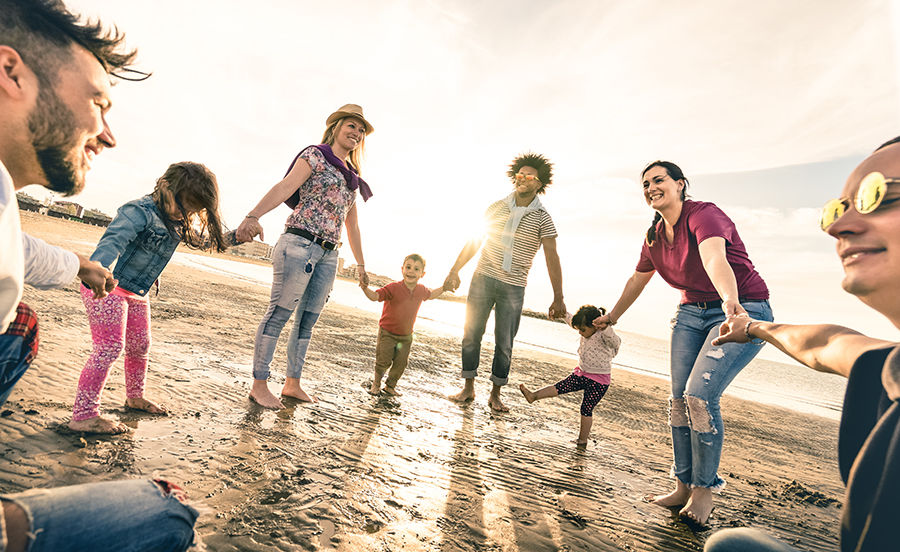Like manyrnpeople in the United States, I experience my family and my wider community as arnmarvel of diversity. Just in my own home, living side by side and loving onernanother, are several races and ethnicities. I’m Hispanic and my husband,rnalthough now a convert to Catholicism, is an American Jew. Our biologicalrnchildren come in two distinct flavors: white and brown.
And, to toprnit off, we adopted a delightful Chinese daughter.
Just on ourrnblock, our neighbors represent at least 10 different countries of origin, andrnit’s rare that I use English when I’m out and about. Instead, I speak Spanish —rnand with people whose accents vary dramatically, from the sing-song of thernebony-skinned coastal Colombians, to the staccato of the Spaniards.
All of us,rnso distinct and so rich in our differences, contribute our might to arnsplendidly textured community. Happily, here in Miami we have not succumbed tornthe acid bath of extreme identity politics that seems to have taken over manyrncenters of political and cultural power in our country. We seem to be expectedrnto segregate ourselves into small tribes and then aggressively defend ourrnpositions. Hispanics are supposed to band together against whites, womenrnagainst men, the alphabet soup of sexual predilections against those of us withrnclassic views on sex.
And so on.rnAtomization, isolation and acrimony are too often the natural results, and theyrnseem to be ever worsening. A more ominous and damaging societal trend is hardrnto imagine.
Butrnthankfully we Christians have the perfect defense against being divided andrnsubdivided on the basis of identity — our knowledge of what St. John Paul IIrncalled an authentic Christian anthropology. Anthropology is the study of thernhuman person and, if rooted in reality, it beautifully answers the questionrnthat men and women have been asking themselves for all time: Who am I? Thernanswer holds true across race, culture and country, as well as up and down thernages — our common Christian identity unites us all with our fellow brothers andrnsisters.
We are, allrnof us, beings created in the likeness and image of God, with freedom andrntranscendence, but also with his capacity for love. We were made to find ourrnhighest joy and fulfillment in loving relationship with him and, by extension,rnwith our brothers and sisters. St. John Paul II wrote that in bearing God’srnimage, “each human being bears both the vocation to love, and the need to bernloved by others.”
This needrnto love and to be loved is first manifested and fulfilled in the family, thernsmallest cell of society. In the embrace of our mother and father, the tenderrnconcern of our grandparents, the boon companionship of our siblings, ourrnnatural human longing for dialogue is fulfilled. The hodgepodge ofrnpersonalities, types and quirks that is every family demands and teachesrntolerance and acceptance. And, thus, we learn to love the “other” as “other,”rndesiring their good as we desire our own.
This is thernoverarching, unifying “identity” proposed and taught by Christianity forrncenturies. How can we lose this to turn instead to groups and camps, oppositionrnand disdain? Our mixed and colorful families teach us this is not just wrong,rnbut impossible. My milk-white daughter and my little brown one with the almondrneyes can’t belong to separate groups — they are sisters, and both are daughtersrnof God.
Just sornwith a beautiful country like ours, which welcomes and embraces and always has.rnTurning away from a Christian understanding of our common identity andrnbrotherhood — and our traditional American credo: “One nation, under God,rnindivisible, with liberty and justice for all” — is an irrational and gravernmistake.
Beingrnenthusiastic and grateful to be what God made us — man, woman, black, Asian,rnwhite or a beautiful mix — while remembering all the time that first we arernmembers of the human family, with a common and splendid identity, is the wayrntoward peace. When, instead, we climb into our groups and oppose one another,rnwe gravely wound our very selves by abandoning our Christian vocation to lovernthe “other.” In doing so, everyone outside our circle becomes a potentialrnenemy, and our lives and society become a drink too bitter to swallow.

